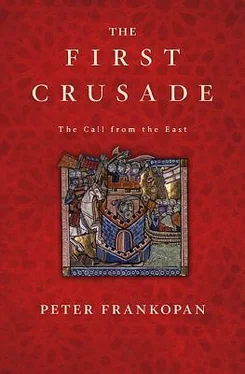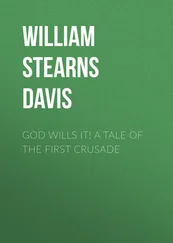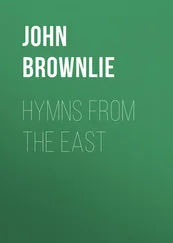Many others took similar steps in 1095 and 1096, taking out loans in return for mortgages against their land and property. The sources leave no doubt that Jerusalem was the main attraction, with almost every individual who signed a charter in this period expressing their desire to travel to the place where Christ walked on earth. 33The prospect of finding repentance in the process was clearly also powerful, as in the case of two brothers from central Burgundy who ‘were going with the others on the expedition to Jerusalem in order to remit their sins’. 34
Some sought to repent before they set out. Hugh Brochard, a knight from Tournus in Burgundy, sought absolution for the many wrongs he had committed, not least seizing land from the church of St Philibert, an act he now recognised as unjustified and sinful. 35His contrition was spurred by the realisation that it was wrong for a sinner who had transgressed against the church to march in its defence, with a cross stitched into his tunic or marked on his forehead. 36
Yet in some cases, efforts were made to actively prevent knights from joining the march east. Pons, Peter and Bernard, three particularly troublesome knights from Mézenc who had relentlessly terrorised the parishioners of the monastery of Le Chaffre in the Auvergne, were initially thwarted in their desire to take part in the expeditions. Public renunciations of their past violence did not convince the local monks, who referred the brothers to the bishops of Le Mende and Le Puy for a ruling as to whether they should be allowed to participate in the expedition. As the bishops listened to the accusations against the three men, they found themselves ‘astonished by their cruelty; but they absolved them on account of the fact that they were going on the expedition to Jerusalem and their apparent contrition’. 37Few would have been sad to see them go. Nevertheless, the fact that the church was trying to control who took part in the expedition and who did not, was an indication of its growing assertiveness and ambition.
Another reason for the consolidation of the power of the church was that it provided the necessary funds for those travelling east. Pilgrimage, armed or otherwise, was expensive. Travelling long distances involved heavy costs in food, transport, equipment and arms, which were magnified when a whole retinue of men had to be supported. As we have seen in the case of Achard of Montmerle, the church was the obvious place to turn to, for monasteries, bishoprics and parishes were often well endowed and able to provide the necessary liquidity. As a substantial landowner the church was a natural lender and an obvious buyer. Thus, when Godfrey of Bouillon, who was to become the first king of Jerusalem after its capture in 1099, set about raising funds for the journey, it was to the church that he turned. He sold his claim to the county of Verdun and the castles of Mosay, Stenay and Montfaucon-en-Argonne to Richier, bishop of Verdun. Other lands and possessions, meanwhile, were sold to the convent of Nivelles. An additional 1,500 marks came from the bishop of Liège, given to Godfrey as a loan. Converting illiquid land holdings into cash, Godfrey was able to raise a very substantial sum of money. 38Robert, Duke of Normandy and son of William the Conqueror, borrowed the enormous sum of 10,000 marks from his younger brother, the English king William Rufus. This meant that Robert did not have to sell ducal lands or borrow from a third party to raise the necessary cash for the Crusade. 39
Despite the expense, dangers and complicated arrangements involved, the popular response to the Pope’s call was all but overwhelming. Men from all over France prepared to head for the east, with major contingents forming under the command of Robert of Normandy, his brother-in-law, Stephen of Blois, and Raymond of Toulouse. Substantial forces were also gathered by Godfrey of Bouillon and his brother Baldwin, as well as by Robert II, Count of Flanders, who had succeeded his father in 1093.
Other important figures committed to join the expedition. One was Hugh of Vermandois, brother of Philip I, king of France, apparently persuaded by a dramatic lunar eclipse at the start of 1096 during which the moon turned blood red, which he interpreted as a sign that he should join the campaign. 40Philip himself was not welcome. His excommunication in 1095 on the grounds of adultery had been confirmed at Clermont, after he had abandoned his wife for being too fat and taken up with the comely Bertrada of Montfort – a woman about whom, apparently, no man had a good word to say, apart from when it came to her looks. 41As excitement about the expedition grew, Philip’s subjects clamoured for him to resolve his position. The king convened a special meeting of his nobles to discuss his options, and by the summer of 1096 he was offering to give up Bertrada to regain Urban’s favour. It was a clear sign that the Pope’s bid to become the leading authority in western Europe was proving successful. 42Although Philip did not take part in the Crusade, his brother Hugh willingly participated and provided a representative of the house of France to the expedition – another boost to the Pope’s plans.
Bohemond, the son of Robert Guiscard, was another stellar recruit. According to the anonymous author of the Gesta Francorum , Bohemond first heard about the expedition when he was besieging Amalfi in 1096 and noticed men passing on their way towards the ports of southern Italy shouting ‘ Deus vult! Deus vult! ’ The author reports that ‘Bohemond was inspired by the Holy Ghost, and ordered the most valuable cloak which he had to be cut up forthwith and made into crosses; most of the knights who were with him at the siege [of Amalfi] began to join him at once.’ 43Bohemond and his men formed an impressive force: ‘What human eye could bear the glitter of their breastplates, helmets, shields or lances in brilliant sunshine?’ 44
Yet Bohemond’s actions were not quite as spontaneous (or plausible) as this report would suggest: instructions to a certain William Flammengus, Bohemond’s right-hand man in Bari, to make a series of land sales in early 1096, suggest that like many others, Bohemond had already liberated funds to take part in the expedition. 45The speed with which he abandoned the siege of Amalfi, raised his men and set out east also indicates that arrangements had been made in advance and were not the result of a sudden decision on the Norman’s part.
Bohemond was an aggressive character with a formidable physique and strong ideas about everything ranging from battle tactics to his hairstyle: he did not grow his hair to his shoulders like other westerners, but insisted on wearing it just above the ear. 46He was an outstanding commander, but as his attack on Byzantium in 1082–3 revealed, he was also prone to egocentricity and laziness – apparently sitting eating grapes with friends on a riverbank while his army attacked imperial forces at Larissa. 47From the Pope’s point of view, however, it was important that at least one leading Norman from southern Italy took part in the expedition. It was difficult to recruit others: Roger of Sicily was shrewd enough to realise that a campaign against Muslims in the east could cause difficulties in his territory, which was home to a sizeable Muslim community. 48Roger Borsa, who succeeded to the dukedom of Apulia in 1085, appears to have had no interest in taking part. His older half-brother, Bohemond, who had been outmanoeuvred on the death of their father Robert Guiscard, jumped at the chance of adventure in the east.
In many ways, Urban’s plan was brilliantly executed: key individuals willing to join the expedition were targeted so that their participation would act as a catalyst for others. As a result, the Pope inspired a mass movement of knights. Enormous effort went into disseminating the call to arms and making the necessary arrangements to translate the massive response into action. But some aspects of Urban’s plans were still vague. The question of the leadership of the expedition was confused, with several figures under the impression that they were commander-in-chief of the massed Crusader army. To start with at least, Urban regarded the bishop of Le Puy as his representative to lead the expedition. 49Others, though, thought of themselves in this role. Raymond of Toulouse, for one, referred to himself as the leader of the Christian knights setting out to capture Jerusalem. 50Hugh of Vermandois also had a high estimation of his own status and carried with him a papal banner, suggesting that he was Urban’s representative on the expedition. 51Some considered Stephen of Blois to be the ‘head and leader of the council of the whole army’; 52he himself certainly thought this was the case, writing back to his wife Adela, daughter of William the Conqueror, that his fellow princes had chosen him to be commander of the entire force. 53
Читать дальше











